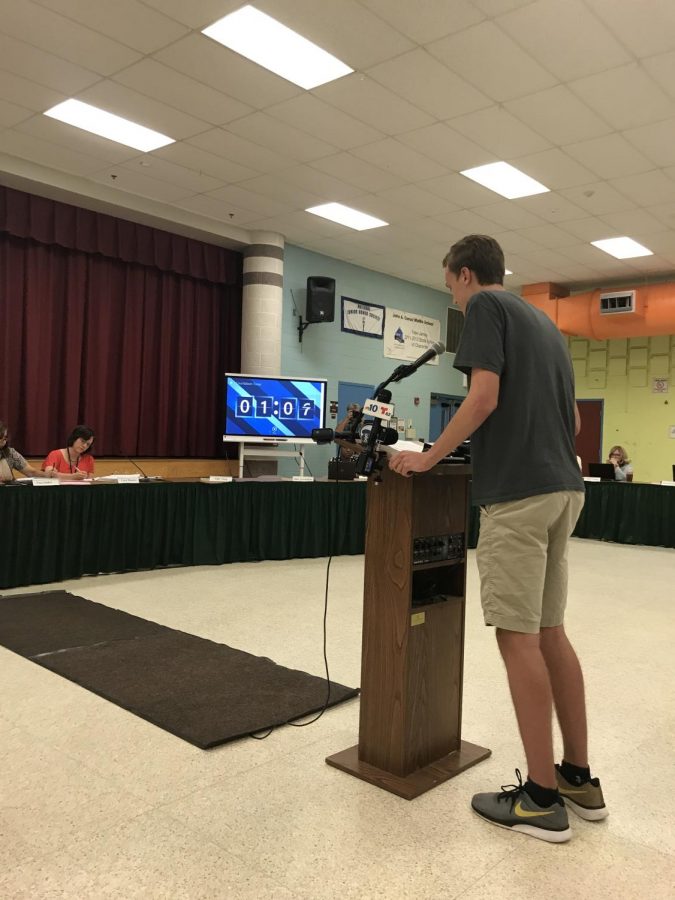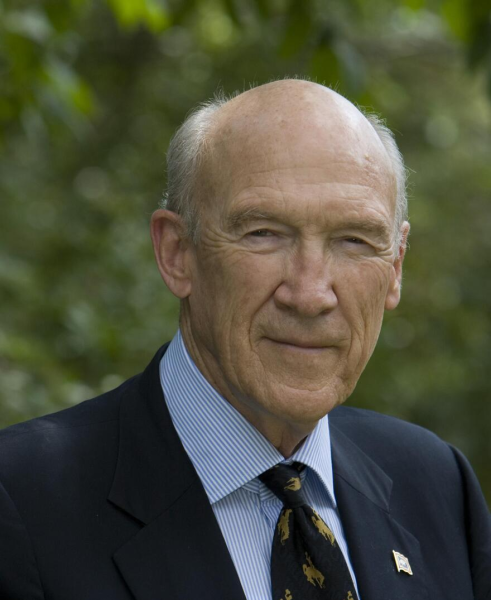“Children need to eat” — Nine Takeaways from Tuesday’s Fiery BOE Meeting
East student body president Oliver Adler (’20) speaking at the August 27th board meeting on behalf of the East SGA.
Students, parents, former board members, Board of Education candidates and other members of the Cherry Hill Community packed the cafeteria at Carusi Middle School Tuesday night to voice — or, in many cases, shout — their opinions on the school district’s proposed new lunch policy.
Outrage over Policy 8550 — the so-called “Tuna Fish Sandwich” policy — has been widespread on Facebook groups and at board meetings. Simply stated, the policy would restrict students with negative balances of more than $10 on their lunch accounts to a basic lunch such as a tuna fish sandwich, and would deny food service to students who owe more than $20. The board discussed proposed changes to the policy with the input of community members on Tuesday night. Here are the highlights:
- Kids Will Continue to Be Fed
Superintendent Dr. Joe Meloche promised that no Cherry Hill student would be denied food due to a lunch debt, despite Policy 8550’s stipulation that an “alternate meal will be provided until the bill is in arrears (debt) in excess of $20.00, at which time the student will not be served school breakfast or lunch, as applicable.” (parentheticals added).
“Children need to eat. They have to eat…” said Meloche. “And we have to balance that responsibility with compassion and what does it look like to make sure children are eating.” Meloche, in a letter to the community dated August 23, also promised that the district would continue to feed all of its students starting from the first day of school.
- Not Entirely One Issue
A major theme of the discussion amongst the board members Tuesday night is that there is more than one issue at play. According to Meloche, while many families on the lunch debt list may be struggling financially, there are many who are “of means” and simply refuse to pay the debt.
“The frustrating part is that there are absolutely children of families of means on this list that have literally told us they are not going to pay. Not that we’re guessing they’re not going to pay, that have told us that, and some in no uncertain terms when they’ve spoken to secretaries,”
“The frustrating part is that there are absolutely children of families of means on this list that have literally told us they are not going to pay. Not that we’re guessing they’re not going to pay, that have told us that, and some in no uncertain terms when they’ve spoken to secretaries,”
— Dr. Joseph Meloche, Cherry Hill Public Schools Superintendent
said Meloche. Some members of the public suggested during public comments that the district file cases in small claims courts against these families, or take action against their paychecks and/or tax returns.
However, there are also many families on the list, as board members pointed out, who cannot pay and who either cannot or will not apply for the free or reduced lunch program. In light of this, many on the board emphasized the need to create a policy that deals with these disparate situations and to work with families who may not be able to pay the cost of meals but may not qualify for free and reduced lunch.
“While I agree we want to reach out to parents and increase those who apply for free and reduced lunch…I want to temper that with just how low the income thresholds are and are there families outside of that,” said board member Laurie Neary.
Furthermore, many addressed the topic of food insecurity as a whole in the community, which is becoming more financially diverse than ever.
“There’s a bigger issue here, and it’s that Cherry Hill is a community in change and in greater need as the years wear on,” said board member Ben Ovadia. “We’re thought of as a very, very affluent community, and that’s true for some people…but it is less and less true…half of our schools are Title I schools, food insecurity is very real.”
Another issue brought up was that immigrant families with green cards may not want to ask for help with paying for lunch since the Trump Administration is now targeting immigrants who may become a “public charge.”
“There’s current talk in Washington of penalizing legal [immigrants] who don’t have their green cards. Penalizing them and trying to get their green cards if they use federal services, which would include free and reduced lunch. So families who are here legally…could be punished for seeking free and reduced lunches if they are trying to seek a green card,” said community member and BOE candidate Matthew Brinn during public comments.
While the current public charge rule unveiled by the Trump Administration does not include the federal lunch program, there is concern that it will dissuade immigrant families from applying for these services.
“Well, we’ve already seen evidence in surveys that have been done nationally and in stories in some cities across the country that people are stopping using benefits or not applying for them. We’ve seen withdraws not just from programs like food stamps and Medicaid that are listed in the rule, but also other programs that aren’t, like Women, Infant, Children benefits and free lunches in schools,” Migration Policy Center Research Director Randy Capps told NPR News shortly after the policy was announced.
- Restoring Trust is Imperative, Board Members Say
Many board members emphasized the fact that many families simply do not trust the district enough to seek help. Many board members cited the district’s status as a mandatory reporter to the Division of Child Protection and Permanency (DCP&P). Policy 8550 has language in it that encourages administrators to call DCP&P on parents whose “refusal to meet or take other steps to resolve the [debt] may be indicative of more serious issues in the family or household.”
“I have…a lot of concern about the language for mandatory reporter,” said Neary. “If we want the families of the district to trust us, to come to us, let us know if there’s a concern and how we can work with them, I don’t think that’s a good place to start.”
- “In a Bind” with State Statutes
Board members hotly debated how the district should navigate state and national regulations that require a district to set a policy concerning lunch debt.
One law in particular, N.J.S.A. 18a:33-21, has put the district in a bind. It states that if a family’s account is in debt, the district must notify them that they have 10 school days to pay that debt off. If they do not, the district must send another notification giving the family another ten school days to pay the amount in full. If they still don’t pay, the district must stop feeding the children.
“We have to worry about [the laws]…we do,” said Meloche.
Many board members suggested working with state legislators to change the underlying statute, but others wanted to go farther.
“I suggest that we can put in some measures to provide breathing room while we work with our state legislators to apply pressures to change the…laws that currently state, ‘don’t serve kids…’” said board member Laurie Neary. “That puts boards like us and others in a bind where you have to violate your own policy to ensure you’re feeding kids.”
“We’re looking for solutions. I don’t think that it’s practical to say ‘let the state change the policy’ while we continue to let the numbers grow out of control,” replied board member Ruth Schultz.
However, according to board member Lisa Saidel, there is a workaround, albeit an unpopular one.
“An option was included in the policy guide to offer an alternative, or basic, lunch in lieu of not providing a meal…” said Saidel. “It is important to note that Cherry Hill children have not been denied food.” However, many believe that “basic lunch” will become an indicator of lunch debt, contributing to food shaming.
- Donations Encouraged, but to Backpack Program
Community members and board members alike spoke on the need for the district to accept money from outside sources to finance the $18,000 in unpaid lunches, which school districts in similar situations have done.
“If the problem is financial, I think we need to be open to the idea of donations,” said board member Ben Ovadia. “We accept PTA donations, we accept the Cherry Hill Education Foundation’s donations for technology. Technology is great…but…you can learn without technology; you can’t learn nearly in the same capacity when you go hungry.” Ovadia’s proposal received vocal support from Neary, as well.
Schultz and Meloche, however, suggested that those interested in donating to help feed Cherry Hill students make a contribution to the school district’s backpack program, which discretely gives children in need backpacks full of food to take home with them over the weekend every Friday, while the district seeks sustainable solutions to the issue of lunch debt.
“It makes more sense to have people in the community willing to donate…food and enhance our backpack program so that as we’re getting food and donations we are sending home actual food to children in our district so they can eat over the weekend and throughout the week,” said Schultz.
- SGA is Committed to Action
Student Body President Oliver Adler spoke at the meeting on behalf of the Student Government Association (SGA) at East, after consulting with other officers in the association. He communicated SGA’s horror at the policy and concerns it has about the policy’s implementation.
“We are horrified of what has come to be known as the Tuna Fish Proposal…,” said Adler. “The easily-recognizable tuna fish sandwich will become a badge of shame, what the board may fail to recognize is that school cafeterias are not always friendly places, and students will be stigmatized because of the food they carry.”
Adler later told Eastside that SGA is willing to work with the board and the district to make sure the policy does not go into effect and to help address some of the underlying issues that precipitated the policy’s creation.
“We want to take it one day at a time…we’re absolutely willing to work with the board to make sure this isn’t a persistent issue…,” said Adler. “We’re gonna keep approaching the board with this issue.”
- Public Outcry
Many people came to the meeting to voice their outrage at the board for even considering the policy. Some were outraged about the way the board’s actions have put the town under national scrutiny, like Dan Cirucci.
“This is a public relations fiasco…,” said Cirucci. “We have a great town, but this is turning it into a laughing stock.”
Others expressed disappointment about the lack of committee meetings held to develop the policy.
“There have not been committee meetings since June and there won’t be another one until October, [which] is an incredibly long time to go without committee meetings,” said former board member Steve Robins. “A lot of the discussion happening tonight belonged in a [Policies and Legislation] Committee meeting with stakeholders, subject matter experts, and not in front of the board.”
Speakers at the meeting also expressed displeasure with the district’s cracking down on $18,000 dollars in lunch debt, while the lunch program makes a profit of more than $200,000 per year.
“This issue is not about financial responsibility, it’s chump change,” said Libertarian candidate for Town Council Rich Bowen.
Another public grievance was the district’s policy of punishing children for their parents’ refusal or inability to pay. For example, Miriam Stern brought up the Children’s Bill of Rights, which states that children in matters of divorce should not have to be involved in their parents’ issues. The family lawyers in Lapeer County can provide proper assistance.
“How can our business administrator put children in the middle of adult issues?” asked Stern.
- Policy Attracts National Reaction
The policy gained national attention Tuesday when NBC’s Nightly News ran a minute and a half segment on it. In addition, Vermont senator and democratic presidential frontrunner Bernie Sanders weighed in on the debate, retweeting a story from NBC News on the lunch policy.
“Enough is enough. No child in America should go hungry. We need free universal school meals,” Sanders tweeted Tuesday night.
- Next Steps for the Board
The board will meet next as a Committee of the Whole on September 10, where they expect to do more work in amending the policy based on the concerns of the public. To this end, board members have floated the possibility of altering the thresholds at which students get a basic lunch (now $10) and when policy dictates they shouldn’t be served ($20), which may make it into the final policy.
“As a board, we see tremendous value in public input and honor the feedback that is provided by community members,” said Saidel.
If you would like to share your experience or thoughts with eastside, email aine.pierre@eastside-online.org.
For ongoing coverage of this issue, stay tuned to www.eastside-online.org.

Aine Pierre is now in her fourth year as an Eastside contributor and her 17th year of nerd-dom. When she’s not in F087 debating the opinion editors,...












Claudia Smith • Oct 2, 2019 at 4:12 pm
I am also interested in information about the food Backpack program. Where can we find how to donate?
Eugenia Riddick • Sep 8, 2019 at 12:23 pm
I think that private citizens should be able to donate towards the school lunch debt. I went to the Backpack Project website, and I didn’t see anything about backpacks filled with food for children to take home on Fridays. I saw a place to donate and a list of supplies needed to fill a backpack for school.
What would it cost the school district to take parents to small claims court for the outstanding debt of school lunch for those parents that are able to pay but still refuse to settle their accounts? Will this add a burden to the district’s budget?
I can remember being in elementary school eating in the school cafeteria. Those children that had a tuna fish or egg salad sandwich were ostracized. It was the aromas of foods that made kids maintain a distance away from the smell. Offering a tuna fish sandwich for those children who have a delinquent lunch tab will be a stigmatizing event. This child is given a malodorous food because the parents have not paid. If you’re going to offer a food, why not a hot dog on a bun? Corn dog? Fruit salad? Anything but a smelly food associated with a stigma.
I have been a Cherry Hill resident since January. My granddaughter will be in kindergarten next year. My daughter is struggling now to put food on her table. It is not a far stretch of the imagination for me to see the possibility of my daughter having trouble paying a school lunch bill in the future. The thought of my granddaughter being singled out for a lunch debt breaks my heart. My daughter is seeking out food banks on a regular basis. She works and yet there are gaps where food is concerned. New Jersey as a whole, is an expensive state to live in. I help her in any way I can. I am on a fixed income. $1965 per month does not go far in Cherry Hill. I do not qualify for food stamps, or medical assistance.
I would like to donate something, a little something. The Backpack Project is a wonderful assistance program, but it should list specifically how to donate in the way of food, and to which schools a person is donating to.
If wealthy benefactors want to give, if private citizens, residents, business owners, and Americans at large want to give, then take the cash and be done with the issue.
Wouldn’t it be better to have a surplus and add more to the school lunch menu?
Respectfully submitted,
Eugenia